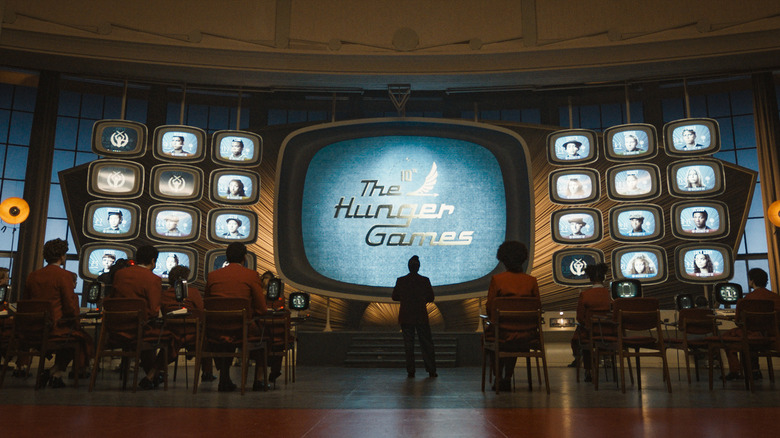How Snow's Actions In The Ballad Of Songbirds And Snakes Directly Create Katniss Everdeen
This article contains spoilers for "The Hunger Games: The Ballad of Songbirds and Snakes."
"The Hunger Games: The Ballad of Songbirds and Snakes" takes the "Star Wars" approach in following a massively successful series of movies by going back in time and telling the story of the villain. Except, where Darth Vader was a fascinating and prominent threat in the original "Star Wars" trilogy, Coriolanus Snow wasn't exactly a force to be reckoned with in the "Hunger Games" series (nor a cool and layered character that begged to have their backstory revealed).
Yet, somehow, the "Ballad of Songbirds and Snakes" film adaptation manages to be an exciting return to this PG-13 battle royale, complete with a plot that's almost unpredictable. It's not that it does something vastly different and fresh, but because it stays so close to retelling the original story, it makes what comes after more impactful and inevitable.
"The Ballad of Songbirds and Snakes" is set 10 years after the rebellion that resulted in the creation of the Hunger Games as punishment for the different districts of Panem. A decade in, there are concerns that people are getting tired of the same old gladiatorial fights to the death. The solution is to recruit the best and brightest young students of the wealthy Capitol to solve the problem and transform this murderous showdown into the hottest TV event of the year. Enter Coriolanus Snow, a young, scrappy and hungry aristocrat who sees an opportunity to turn what are essentially death row inmates into superstars that all of Panem falls in love with.
"The Ballad of Songbirds and Snakes" asks: What if Coriolanus Snow inadvertently created the conditions that caused Katniss Everdeen to lead a revolution that ultimately ended with his death? What if her role wasn't messianic but inevitable?
Snow always falls on top, until he doesn't
Essentially, the future president of Panem, Coriolanus Snow, became a man capable of beating the Kobayashi Maru scenario by changing the conditions of the test. It started when Snow was assigned as a mentor to a tribute he realized would never be able to win, Lucy Gray Baird. Despite not being an obvious winner, she is capable of captivating audiences with her singing. This prompts Snow to do everything in his power to put the young woman in front of an audience and to make the games as much a popularity contest as they are a fight to the death so she has a chance.
Over the course of "The Ballad of Songbirds and Snakes," we watch as Snow comes up with elements that make the Hunger Games what they are in Katniss' time. He turns the gladiator match into a barbaric soap opera where people are invested in and inspired by the fighters. Tasked with increasing the TV ratings for the games, he realizes that if audiences are invested in the tributes as people rather than merely fighters, they'll actually watch the games and care about who lives and who dies. However, as he falls in love with Lucy Gray, Snow's attempts at cheating or changing the game to keep her alive lead to the introduction of new rules, like those involving sponsors sending aid to tributes mid-game.
Basically, the more Snow worked to make the games more popular and long-lasting, the more he created the conditions that would inevitably lead to a tribute being so charismatic and beloved that she could start a revolution against the Capitol itself. His doomed romance with Lucy Gray ended up being his own death sentence.
The spark that lights the fuse
Because of Snow, the people of the Capitol (and Panem at large) come to care about the tributes and begin to hope they win. This also means that small acts of kindness between tributes, such as when one of the tributes wraps the dead in the arena with the flag of Panem in "The Ballad of Songbirds and Snakes," inspire sympathy across the districts.
The actions Snow takes in the "Hunger Games" prequel film allow Katniss to weaponize the Hunger Games and its glorification of the gladiatorial winner decades later. First, she sings a song to Rue as she dies, which fuels the rage of the districts. Then, she changes the conditions of the test out of love to save Peeta — just like Snow once did for Lucy — which shows the Capitol isn't infallible, and accidentally starts a chain reaction that inspires rebellion in other districts. Inevitability seems to be the key theme of "Ballad of Songbirds and Snakes," both in Snow's turn to evil, and how his rise leads to Katniss.
This inevitability reframes Katnis as not so much a messianic figure but rather a final spark to a decades-long fuse ready to blow. It's reminiscent of the utter shock to the system that makes "The Matrix Reloaded" so brilliant — how it interrogates the idea of The One. In that movie, Neo isn't special because he was born as The One, but because he changed the conditions of his own rite of passage and did something no other The One had done: choose love. Like Katniss, Neo was an inevitability, and they both broke the systems that surrounded them.
"The Hunger Games: The Ballad of Songbirds and Snakes" is now playing in theaters.


